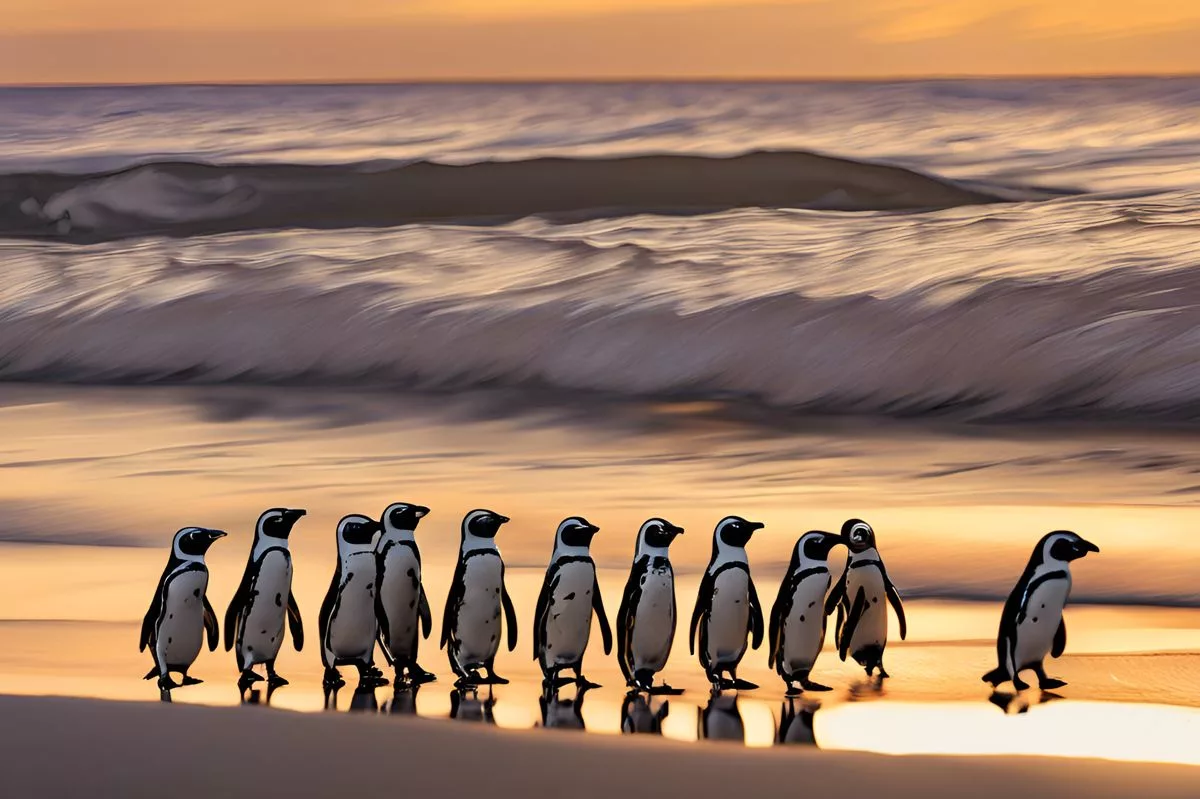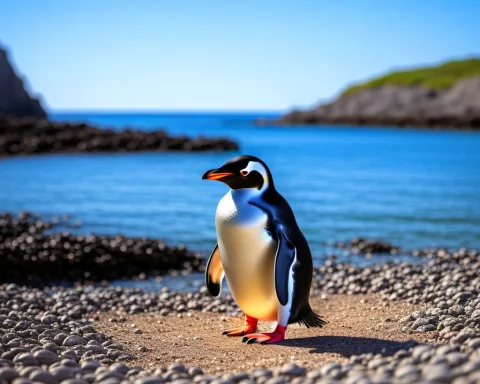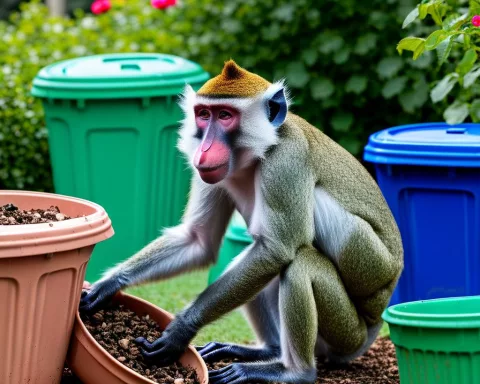African penguins, known for their cute waddles and funny calls, are in big trouble. Their numbers have dropped by 97%, and if we don’t act fast, they could disappear by 2035! To help save these charming birds, you can sign petitions, share their story on social media, teach others about their importance, or volunteer with groups like SANCCOB. Every little bit counts, and your support can make a huge difference in keeping the African penguin waddling along South Africa’s shores for years to come!
What can be done to save African penguins?
To save African penguins, individuals can:
1. Sign petitions urging government action for penguin protection.
2. Share information on social media to raise awareness.
3. Educate communities about their ecological importance.
4. Support or volunteer with conservation organizations like SANCCOB.
Your involvement is crucial for their survival!
Imagine a world devoid of the charming waddle of African penguins along the rocky shores of South Africa. This unsettling scenario inches closer each year, yet it is not an inevitability. As custodians of the planet, we possess the ability to alter this path and prevent these beloved creatures from fading into oblivion.
The Dire Situation Facing African Penguins
African penguins, often recognized by their unique braying call that earned them the nickname “jackass penguins,” once flourished along the coastlines of South Africa and Namibia. Today, they stand on the precipice of extinction. Known for their striking black-and-white plumage and captivating behavior, these penguins symbolize the pristine beauty of the region. However, their numbers have plummeted by an astonishing 97%, placing them at serious risk of vanishing from the wild by 2035 if current trends continue.
The decline of African penguins is a poignant reflection of the broader challenges faced by wildlife across the globe. Their plight serves as a critical reminder of the fragile balance within natural ecosystems. With their numbers dwindling at an alarming rate, the need for immediate action becomes ever more pressing.
The journey to understanding and addressing the challenges faced by African penguins begins with acknowledging the severity of their situation. As one of the most iconic species in the region, their potential disappearance would not only signify a loss of biodiversity but also a cultural and ecological tragedy that is irreversible.
The Crisis Beneath the Waves: Depletion of Food Resources
At the heart of the African penguin’s struggle is a fierce competition for food beneath the ocean’s surface. These penguins primarily feed on sardines and anchovies, but human activities, especially commercial purse-seine fishing, drastically reduce the availability of these fish. As a result, penguins find it increasingly difficult to secure sufficient food to survive and raise their young.
Recent research highlights the insufficiency of existing conservation measures. Although some no-take zones have been established, they cover less than half of the penguins’ critical feeding areas. This limited protection fails to ensure their survival, leaving them vulnerable to starvation and further population decline.
To address this dire situation, it is crucial to prioritize the establishment of more extensive no-take zones. These protected areas would allow penguins to forage without competition from human activities, thereby increasing their chances of survival. Without such measures, the survival of African penguins remains in jeopardy.
Mobilizing for Change: How You Can Help
Prominent organizations like the Southern African Foundation for the Conservation of Coastal Birds (SANCCOB) and BirdLife South Africa are actively working to safeguard these endangered birds. They are pursuing critical legal actions against the South African government to demand better protection for penguins. However, they cannot achieve success alone. Your involvement plays a crucial role in amplifying their efforts and driving impactful change.
1. Amplify Your Voice through Petitions
Every signature counts. By visiting the OnlyOne petition platform, you can join a growing movement urging the South African government to implement immediate and effective penguin protection measures. Your support is vital in increasing pressure for policy changes.
2. Leverage Social Media for Awareness
Social media is a powerful tool for spreading the word about the African penguin’s plight. Share information about the petition, showcase captivating images of these penguins, and inspire others to join the cause. Your online presence can reach communities far and wide, raising awareness and encouraging action.
3. Advocate for Penguin Conservation
Educate yourself about the challenges facing African penguins and engage others in conversations about their importance. Share your knowledge at schools or within your community to increase awareness and foster a culture of conservation. By doing so, you help create a supportive environment that champions the penguins’ survival.
4. Contribute to Conservation Efforts
Consider contributing to or volunteering with organizations like SANCCOB and BirdLife South Africa. These groups are at the forefront of penguin conservation, and your support directly fuels their crucial work. Whether through donations or hands-on involvement, your contributions make a meaningful difference.
Urgency and Impact: The Broader Ecosystem
Joining the campaign to save African penguins is not just about preserving a single species; it contributes to the health of entire marine ecosystems. African penguins serve as an “indicator species,” revealing larger issues within the oceanic environment that affect various species, including humans. Implementing proposed changes in fishing regulations could significantly benefit penguins without causing major disruptions to the fishing industry.
Moreover, the preservation of African penguins goes beyond conservation—it embodies the protection of South Africa’s natural heritage. These penguins are emblematic, attracting tourists from around the world and playing an essential role in local economies. Their survival is not only an environmental priority but also a cultural and economic necessity.
Recognizing the interconnectedness of all life forms, the story of the African penguin underscores the need for responsible environmental stewardship. As we act to safeguard these penguins, we also contribute to preserving the delicate balance of the ecosystems they inhabit and the countless species dependent on them.
A Cultural and Historical Perspective
The African penguin’s cultural and historical significance is reflected in artistic movements that celebrated the natural world. The Romantic era, for instance, emphasized the awe-inspiring beauty of nature, often depicting creatures like penguins in their habitats. Artists captured these environments, highlighting the intrinsic connection between humans and the animal kingdom.
In literature, penguins have been featured in narratives that explore their unique behaviors and habitats. These stories emphasize the interconnectedness of life and the responsibility humans bear in maintaining biodiversity. Through these depictions, penguins become symbols of resilience and the enduring beauty of nature.
A Call to Action for the Future
The story of the African penguin illuminates critical ecological dynamics. As part of the marine food web, their decline impacts predators and prey alike, disturbing the balance of ecosystems. The absence of these penguins would echo throughout the environmental hierarchy, affecting wildlife and the human communities reliant on marine resources.
In conclusion, the fate of African penguins rests in our hands. By taking action now, you play an essential role in preserving a crucial element of global biodiversity. Raise your voice, spread awareness, and support conservation efforts. Together, we can ensure that future generations experience the captivating presence of these remarkable birds and the vital ecosystems they inhabit.
FAQ: Safeguarding the Future of African Penguins
What is the current status of African penguins?
African penguins have experienced a dramatic decline in their population, dropping by 97%. If immediate action is not taken, they could face extinction by 2035. This situation highlights the urgent need for conservation efforts to protect these beloved birds.
What are the main threats to African penguins?
The primary threat to African penguins is the depletion of their food resources, particularly sardines and anchovies, due to overfishing and competition from commercial fishing activities. Other challenges include habitat loss and the impacts of climate change.
How can individuals help save African penguins?
Individuals can contribute to the conservation of African penguins by signing petitions, sharing information on social media, educating their communities, and volunteering or donating to organizations like SANCCOB and BirdLife South Africa. Every action, no matter how small, can make a significant difference.
Why are African penguins considered an “indicator species”?
African penguins serve as an “indicator species,” meaning that their health reflects the overall condition of the marine ecosystem. Their decline signals larger issues affecting marine life, making their conservation critical for maintaining ecological balance.
What organizations are actively working to protect African penguins?
Organizations such as the Southern African Foundation for the Conservation of Coastal Birds (SANCCOB) and BirdLife South Africa are leading conservation efforts. They work on legal actions and initiatives to enhance protection measures for African penguins and their habitats.
What can I do on social media to raise awareness about African penguins?
On social media, you can share compelling images and facts about African penguins, promote petitions, and engage your followers in discussions about their importance. Spreading awareness online can significantly amplify the message and inspire others to take action in support of penguin conservation.












